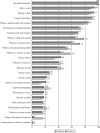Rates of trauma spectrum disorders and risks of posttraumatic stress disorder in a sample of orphaned and widowed genocide survivors
- PMID: 22893816
- PMCID: PMC3402134
- DOI: 10.3402/ejpt.v2i0.6343
Rates of trauma spectrum disorders and risks of posttraumatic stress disorder in a sample of orphaned and widowed genocide survivors
Abstract
Background: During the Rwandan genocide of 1994, nearly one million people were killed within a period of 3 months.
Objective: The objectives of this study were to investigate the levels of trauma exposure and the rates of mental health disorders and to describe risk factors of posttraumatic stress reactions in Rwandan widows and orphans who had been exposed to the genocide.
Design: Trained local psychologists interviewed orphans (n=206) and widows (n=194). We used the PSS-I to assess posttraumatic stress disorder (PTSD), the Hopkins Symptom Checklist to assess depression and anxiety symptoms, and the M.I.N.I. to assess risk of suicidality.
Results: Subjects reported having been exposed to a high number of different types of traumatic events with a mean of 11 for both groups. Widows displayed more severe mental health problems than orphans: 41% of the widows (compared to 29% of the orphans) met symptom criteria for PTSD and a substantial proportion of widows suffered from clinically significant depression (48% versus 34%) and anxiety symptoms (59% versus 42%) even 13 years after the genocide. Over one-third of respondents of both groups were classified as suicidal (38% versus 39%). Regression analysis indicated that PTSD severity was predicted mainly by cumulative exposure to traumatic stressors and by poor physical health status. In contrast, the importance given to religious/spiritual beliefs and economic variables did not correlate with symptoms of PTSD.
Conclusions: While a significant portion of widows and orphans continues to display severe posttraumatic stress reactions, widows seem to constitute a particularly vulnerable survivor group. Our results point to the chronicity of mental health problems in this population and show that PTSD may endure over time if not addressed by clinical intervention. Possible implications of poor mental health and the need for psychological intervention are discussed.
Keywords: Posttraumatic stress disorder; Rwanda; anxiety; depression; genocide; risk factors.
Figures
References
-
- Amir M., Lev-Wiesel R. Time does not heal all wounds: Quality of life and psychological distress of people who survived the Holocaust as children 55 years later. Journal of Traumatic Stress. 2003;16:295–299. - PubMed
-
- Auswärtiges Amt. Country information: Rwanda. 2006. Retrieved July 26, 2006, from http://www.auswaertiges-amt.de/diplo/de/laender-information/Ruanda.
-
- Begic D., Jokic-Begic N. Violent behaviour and post-traumatic stress disorder. Current Opinion in Psychiatry. 2002;15:623–626.
-
- Bolton P. Local perceptions of the mental health effects of the Rwandan genocide. Journal of Nervous and Mental Disease. 2001;188(4):243–248. - PubMed
-
- Bolton P., Betancourt T. S. Mental health in postwar Afghanistan. Journal of the American Medical Association. 2004;292(5):626–628. - PubMed
LinkOut - more resources
Full Text Sources
Miscellaneous

